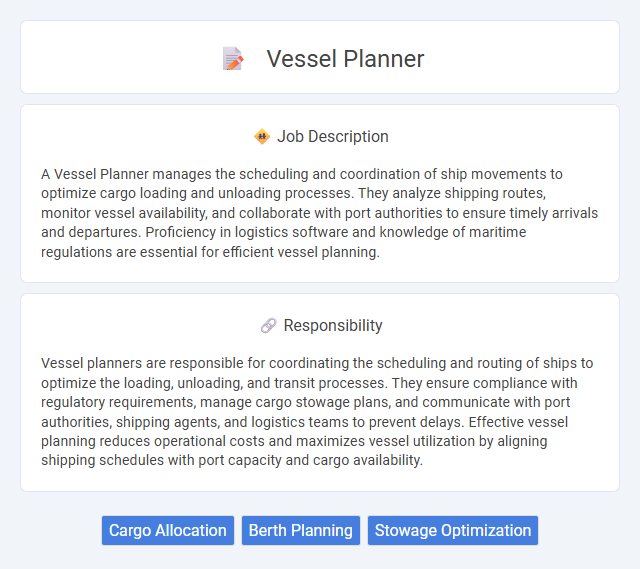
A Vessel Planner manages the scheduling and coordination of ship movements to optimize cargo loading and unloading processes. They analyze shipping routes, monitor vessel availability, and collaborate with port authorities to ensure timely arrivals and departures. Proficiency in logistics software and knowledge of maritime regulations are essential for efficient vessel planning.
Individuals with strong organizational skills and the ability to manage multiple tasks under pressure are likely to be well-suited for the Vessel Planner role. Those who enjoy coordinating schedules, communicating with various teams, and making data-driven decisions may find this job particularly fitting. People who prefer a dynamic work environment and can adapt quickly to changing priorities have a higher probability of thriving in this position.
Qualification
A Vessel Planner typically requires a strong background in maritime logistics, shipping operations, or supply chain management, often supported by a bachelor's degree in Marine Transportation, Logistics, or a related field. Proficiency in vessel scheduling, cargo stowage planning software, and knowledge of international shipping regulations ensures efficient and safe vessel operations. Strong analytical skills, attention to detail, and effective communication abilities are essential to coordinate between ship crews, port authorities, and cargo owners.
Responsibility
Vessel planners are responsible for coordinating the scheduling and routing of ships to optimize the loading, unloading, and transit processes. They ensure compliance with regulatory requirements, manage cargo stowage plans, and communicate with port authorities, shipping agents, and logistics teams to prevent delays. Effective vessel planning reduces operational costs and maximizes vessel utilization by aligning shipping schedules with port capacity and cargo availability.
Benefit
Working as a Vessel Planner likely enhances logistical efficiency and optimizes ship scheduling, which can result in reduced operational costs and improved cargo handling. The role probably offers opportunities for developing analytical and problem-solving skills essential in maritime and supply chain industries. Employees in this position might also benefit from gaining practical experience in maritime logistics, increasing their career advancement prospects.
Challenge
The challenge in a Vessel Planner job likely involves coordinating complex shipping schedules while managing unpredictable factors such as weather conditions and port delays. Optimizing cargo space to maximize efficiency and cost-effectiveness may require balancing multiple priorities and stakeholder demands. Success in this role probably depends on strong analytical skills and the ability to adapt quickly to dynamic maritime environments.
Career Advancement
Vessel Planner roles offer significant opportunities for career advancement within maritime logistics by enhancing skills in route optimization, cargo coordination, and fleet management. Mastery of advanced planning software and real-time data analysis positions professionals to move into senior operational or managerial roles. Expertise gained in scheduling efficiency and regulatory compliance is highly valued, enabling progression to strategic planning or supply chain leadership positions.
Key Terms
Cargo Allocation
Vessel Planners specializing in cargo allocation optimize stowage plans to maximize vessel capacity while ensuring safety and compliance with maritime regulations. They analyze cargo characteristics, weight distribution, and destination schedules to efficiently allocate space, reduce transit times, and minimize operational costs. Advanced software tools are employed to create detailed cargo manifests, promoting optimal load balancing and preventing structural stress on the vessel.
Berth Planning
Vessel Planners specializing in berth planning optimize the allocation of ships to available berths, ensuring efficient turnaround and minimizing dockside congestion. They analyze vessel schedules, port capabilities, and cargo handling requirements to develop detailed berth plans that enhance operational flow and reduce delays. Utilizing real-time data and port resource management systems, these professionals coordinate with shipping lines, terminal operators, and logistics teams to maximize berth utilization and improve overall port productivity.
Stowage Optimization
Vessel Planner roles emphasize stowage optimization to maximize cargo capacity while maintaining vessel stability and safety. Efficient stowage planning involves strategic container placement based on weight distribution, cargo type, and accessibility requirements to reduce loading and unloading times. Advanced software tools and real-time data integration are critical for optimizing space utilization and ensuring compliance with maritime regulations.
 kuljobs.com
kuljobs.com